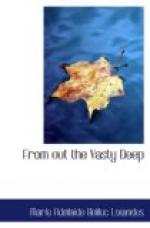All the other men of the party, with the exception of old Mr. Burnaby—who had gone to bed for good after his dramatic bolt from the drawing-room—had disappeared some time ago. But Donnington had stayed on downstairs, absorbed in a curious, privately printed book containing the history of Wyndfell Hall.
Suddenly his eyes fell on the following passage:
“Every piece of the furniture in ‘the White Parlour,’ as it is still called, is of historic value and interest. To take but one example. A low, high-backed chair, covered with petit point embroidery, is believed to have been the prie-dieu on which the Princesse de Lamballe knelt during the whole of the night preceding her terrible death. In a document which was sold with the chair in 1830, her servant—who, it appears, had smuggled the chair into the prison—recounts the curious fact that the poor Princess had a prevision that she was to be torn in pieces. She spent the last night praying for strength to bear the awful ordeal she knew lay before her.”
Donnington shut the book. “That’s strange!” he muttered to himself as he got up.
After putting the book back in the bookcase where he had found it, he stood and looked round the splendid apartment with a mixture of interest and delighted attention.
Yes, this wonderful old “post and panel” dwelling was the most beautiful of the many beautiful old country houses with which he had made acquaintance in the last two or three years; and it was awfully good of Bubbles to have got him asked here! Even if she hadn’t actually suggested he should come, he knew that of course he owed his being here to her.
The queer, enigmatic, clever girl had the whole of Donnington’s steadfast heart. Since he had first met Bubbles—only some eighteen months ago, but it now seemed an eternity—all life had been different.
At first she had at once repelled, attracted, and shocked him. He had been much taken aback when she had first proposed coming to see him, unchaperoned, in the modest rooms he occupied in Gray’s Inn. Then, after she had twice invited herself to tea, her constant comings seemed quite natural. Sometimes she would be accompanied by a friend, either another girl or a man, and they would form a merry, happy little party of three or four. But of course he was far, far happiest when she came alone. Almost from the first moment there had been a kind of instinctive intimacy between them, and very soon she had learnt to rely on him—even to take his advice about little things—and to come to him with all her troubles.
Bubbles Dunster had already been what Donnington in his own mind called “deeply bitten” with spiritualism before they had met; yet he had known her for some considerable time before she had allowed him to know it. Even now she tried, ineffectually, to keep him outside all that concerned that part of her life. But, as he once had told her with more emotion than he generally betrayed, he would have followed her down to hell itself.




